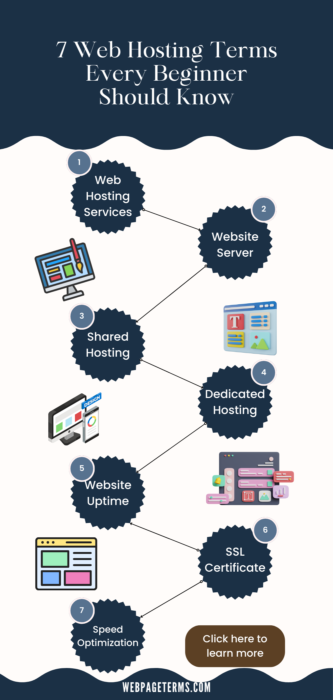Launching your first website is a thrill—until you hit the wall of web hosting jargon. Terms like “virtual private server” or “content delivery network” might sound intimidating, but you don’t need to master everything at once. At webpageterms.com, we’ve boiled it down to the seven most important web hosting terms every beginner should know: Web Hosting Services, Website Server, Shared Hosting, Dedicated Hosting, Website Uptime, Website SSL Certificate, and Website Speed Optimization. These are your stepping stones to getting online without the overwhelm. Let’s dive in!

1. Web Hosting Services: Your Website’s Lifeline
Think of web hosting services as the magic that puts your site on the internet. It’s a company (like Bluehost or SiteGround) renting you space to store your website’s files so anyone, anywhere, can visit it. Without hosting, your site is just a folder on your laptop—pretty, but invisible.
For beginners, this is step one. Hosting services come in flavors (we’ll get to those), but the core idea is simple: you pay for a spot online. It’s like renting an apartment for your website to live in. Start here, and the rest falls into place.
Nervous about your first hosting choice? Bluehost’s 30-day money-back guarantee lets beginners try worry-free—build your site with top tools and ditch the risk. Click to start your website adventure with nothing to lose!

2. Website Server: The Home Base
A website server is the physical (or virtual) machine where your site’s files live. Picture a powerful computer humming in a data center, serving up your pages when someone types your URL. It’s the foundation of hosting—without a server, there’s nothing to host.
Beginners need this term to grasp the “where” of their site. Servers can be shared or solo (more on that soon), but knowing they’re the backbone helps you ask the right questions when picking a host. It’s your site’s home—make sure it’s a good one.
3. Shared Hosting: The Budget Roommate Setup
Shared hosting is the beginner’s go-to. It’s when multiple websites share one server, splitting the cost. Think of it like renting a room in a house with roommates—cheap and easy, but you share resources like speed and storage.
For newbies, this is often the first hosting choice. It’s affordable (sometimes $3-10/month), perfect for small sites or blogs. The catch? If a “roommate” gets tons of traffic, your site might slow down. Still, it’s a solid start—check out our top picks.
4. Dedicated Hosting: Your Private Mansion
On the flip side, dedicated hosting gives you a whole server to yourself. No sharing, no slowdowns—just your site with all the power. It’s like owning a mansion instead of renting a room: pricier, but you control everything.
Beginners might not need this yet, but knowing it exists is key. It’s ideal for big sites or future growth (think $50-100+/month). Understanding the contrast with shared hosting helps you plan—start small, dream big.
5. Website Uptime: Keeping the Lights On
Website uptime is how often your site is online and working. Hosts promise percentages like 99.9% uptime, meaning it’s down just minutes a year. If uptime dips, your visitors see errors—and might not come back.
For beginners, this is a dealbreaker. A site that’s always down is a ghost town. Look for hosts guaranteeing high uptime (our website hosting tool highlights reliables). It’s your site’s pulse—keep it steady.
6. Website SSL Certificate: The Trust Badge
A website SSL certificate locks your site with “https” instead of “http,” encrypting data between your server and users. It’s the padlock in the browser bar, signaling safety. Without it, visitors might see “Not Secure” warnings.
Beginners need this ASAP—it’s non-negotiable in 2025. SSL boosts trust, protects users (like form submissions), and even helps SEO. Most hosts offer free SSL (via Let’s Encrypt), so snag it. It’s your site’s handshake—make it secure.
7. Website Speed Optimization: The Need for Speed
Website speed optimization is about making your site load fast. Slow sites lose visitors—studies show 40% abandon pages taking over 3 seconds. Hosting plays a huge role: good servers, less sharing, and smart setups speed things up.
For newbies, speed is a wake-up call. A zippy site keeps users happy and Google smiling (it ranks faster sites higher). Pick a host with speed perks (like SSD storage)—our Web Hosting Tool can guide you. It’s not just tech; it’s retention.
Why These Seven Matter
These terms—Web Hosting Services, Website Server, Shared Hosting, Dedicated Hosting, Website Uptime, Website SSL Certificate, and Website Speed Optimization—are your hosting crash course. They cover the what (services, server), the how (shared vs. dedicated), and the why (uptime, SSL, speed). Together, they help you choose a host that fits your budget and goals.
Skip the geeky stuff like “website cache” or “virtual private server” for now—these seven are plenty to launch with confidence. They’re practical: pick a service, secure a server, balance cost, and keep users happy. Want to compare hosts? Our breaks it down.
Your Next Steps
Building a site starts with hosting, and these terms are your toolkit. Test them out: check a host’s uptime promise, look for SSL, feel the speed difference. Pair them with a slick design (try our free Website Color Palette Tool), and you’re golden.
Hosting isn’t rocket science—it’s about picking a reliable home for your site. Master these seven, and you’re not just a beginner—you’re a website owner who gets it. Ready to start? Dive into our tools and get hosted today!
